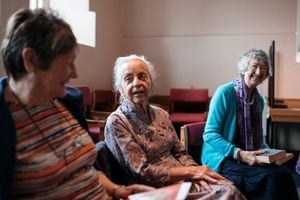Charity helps county cope with ageing population
People are living longer. In Telford & Wrekin, the number of people above the age of 90 is expected to near-quadruple, reaching 3,900 by 2039. In the rest of Shropshire, the number will more than treble to 11,900.

Good news for the county? Unquestionably. But it also provides a number of problems which the county is going to have to deal with over the next couple of decades.
"Increasing numbers of older people mean increasing demand on our services and those provided by others," says Kevin Moore, operations director of Age UK Shropshire Telford & Wrekin.
"Although people are living longer, they are also living in poorer health."
Mr Moore says by the time somebody reaches their early 80s, six in every seven will suffer from at least one long-term condition such as heart disease, diabetes, asthma, a stroke or cancer. Past the age of 85, four in every five will be living with at least two. On top of this, more than a third of people in their late 80s have difficulty in undertaking five or more everyday tasks, such as preparing meals, taking medication, washing or using the toilet.
"Given that the number of people aged 85-plus has increased by a third in the past decade and will double by 2036, it's no surprise that this will
place increasing strain on both health and social care services," says Mr Moore.
"However, we also know that holistic, preventative services can positively impact older people’s wellbeing and independence and slow down the rate of demand on more expensive, complex acute services."
In an effort to meet these demands, Age UK employs some 850 volunteers providing support for thousands of elderly people across the county, ranging from setting up "befriending" services for people living alone, through running day centres, to organising holidays at the seaside.
"We're one of the most successful branches in the country for recruiting and keeping volunteers," says Mr Moore. "Other branches look at us with envy."
The charity also provides help with basic chores such as shopping, gardening and household maintenance for more than 1,000 people around the county. It also provides services on behalf of the NHS in assessing the non-medical support that patients need. And as the number of elderly people grows exponentially, the pressures on charities such as Age UK in the county will grow ever more intense.
"The biggest challenge we are seeing at the moment is dementia," says Mr Moore.
"Dementia is an age-related condition, and it is rocketing across the country.
"The requests we are getting for some of our services are getting far more complex than they were even five years ago."
An example of how the growing demands of an ageing population increases pressure on the charity is the new dementia respite service it launches at a sheltered accommodation scheme in Shrewsbury next month. The project, which could pave the way for more similar schemes, is a joint venture with Wrekin Housing Trust to provide weekly secure day care for people suffering from dementia.
Age UK Shropshire Telford & Wrekin's Ruth Brown says: "It sounds terrible to say this, but our day centres are not secure units, and for people with severe cases of dementia, that is sadly what they need."
Mr Moore says that as people live longer lives, they might find themselves attending a day centre for five, 10, maybe 30 years, and there needs will change considerably over that time.
"If a centre is being run by a handful of well-meaning volunteers, that provides a real challenge for us," he says. "It has to be handled very sensitively.
"We might have people who have been coming to us for over 10 years, and we have to say to them we don't think we can provide a safe and secure environment any more."
The new respite scheme, which will be based at the Shire Living scheme at Withywood, aims to fill that gap. A partnership with Wrekin Housing Trust, the scheme will use fully trained staff to provide a secure environment for people with dementia one day a week.
"Wrekin Housing is providing the location and the staffing, it is like a five-star hotel, it's beautiful there," says Mr Moore.
"It is somewhere that dementia sufferers will feel safe and supported, and it will allow their loved ones to go out and do shopping or have their hair cut, or whatever they need to do.
"We initially expect it will cater for around 20 older people, but if the demand is there, we will probably expand it.
"It is being trialled in Shrewsbury, but if successful we might also launch a scheme in Telford & Wrekin." The charity also runs nine "drop-in" centres that people with dementia can attend with their carers.
Poverty is another issue which can slip under the radar. Mr Moore talks about a recent case involving an 82-year-old widow living alone in a cold, terraced cottage without central heating, in need of major repairs.
"Badly advised in the past, she had an interest-only mortgage but no repayment mechanism so having to sell her home of 30 years," he says.
"Her income was less than her outgoings and despite a painful back and arthritis the 82 year old was attempting to hold down a cleaning job to make ends meet. She owed a significant amount of unpaid council tax."
The charity's benefits advice service spoke to the council to come to an arrangement on council tax arrears, and helped her apply for attendance allowance, as well as an exemption from future council tax bills.
"She would also be entitled to help with housing costs once she had sold her house and moved into rented accommodation," says Mr Moore, adding that she was also entitled to free dental and eye care, as well as transport to hospital appointments.
"She no longer has to worry or work to make ends meet," says Mr Moore
Loneliness is another major issue for older people, particularly in a rural county such as Shropshire, and much of the charity's work is based around combatting the problem.
"We estimate that approximately 10,000 older people in Shropshire have meaningful contact with friends, family or neighbours less than once a month, and 15,000 less than once a week," says Mr Moore.
"It is well documented that for an older person, the health impact of being isolated is equivalent to smoking 15 fags a day."
One of the big successes has been the walking football groups the charity has set up in both Telford and Shrewsbury. The Telford group was so successful that after a few years it was able to break away from Age UK and become an independent group.
"It can be hard getting men to join in with things," says Mr Moore. "The walking football gets them active, which is important, but it's also about the bond of friendship and camaraderie. The going to the pub afterwards is just as important as the physical side."
The charity also runs a "telephone buddy" scheme where volunteers telephone lonely elderly people in their homes.
Age UK Shropshire Telford & Wrekin, which is a separate charity from the national Age UK, also runs 40 day centres across the county, where people can meet in a social environment.
"They are not boring day centres," says Mr Moore. "People have an image of a group of old people sat in a circle with rugs over their knees, but these groups feature activities, trips to the pub, canal trips. For many people this will be their only social activity of the week."
The charity also runs an annual summer holiday in Llandudno, which Mr Moore says has become one of the most popular events on the branch's calendar.
"We usually take 100-plus with us," he says. "In the days when we used to sell tickets, you used to get people queuing out into the street. Today, it's all done by application form instead.
"In many cases it is people who wouldn't otherwise have a holiday. A week in Llandudno shouldn't be seen as a luxury, it's something everybody should be able to do. It's what makes us human."





